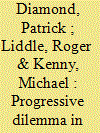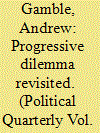| Srl | Item |
| 1 |
ID:
152548


|
|
|
|
|
| Summary/Abstract |
This special edition reflects on the contemporary relevance of the insights and concerns of David Marquand's book The Progressive Dilemma. In this Introduction, the editors set the scene for these reflections. They consider the structural changes that have occurred in politics since the 1990s: the impact of globalisation, the erosion of class identities, the rise of ‘identity politics’ and the continued fragmentation of the party system. There has been no reconciliation between the parties of the centre-left, nor any re-examination of the ‘liberal tradition’ and the potential for a new synthesis with revisionist social democracy. On the one hand, Corbynism is a radicalised metropolitan species of liberalism, while on the other there are plenty in Labour who stress the need for the party to re-engage with the traditional, socially conservative values of the working class in a new ‘postliberal’ appeal. Yet the authors argue that those who broadly identify with progressive causes in British politics—animated by the various overlapping strands of social liberalism, social democracy and liberal socialism—have still to work out how to address the historic failings that Marquand so eloquently exposed, to create a new and inspiring intellectual vision that unites and energises the left and centre-left.
|
|
|
|
|
|
|
|
|
|
|
|
|
|
|
|
| 2 |
ID:
152567


|
|
|
|
|
| Summary/Abstract |
In his book of the same title, David Marquand identified the progressive dilemma faced by many intellectuals since the beginning of the twentieth century as a question of whether it was better to work through a political party or through civil society to achieve reform. This dilemma was sharpened by the emergence of the Labour party as the main challenger to the Conservatives, because the party was so closely identified with the defence of a particular interest. This hindered the creation of the kind of broad electoral coalition that could win general elections. Throughout most of its history, Labour has failed to realise its promise and sustain reforming governments. In this article, the history of the Labour party over the past hundred years is outlined, in particular the three cycles 1931–51, 1951–79 and 1979–2010 and the divisions and recriminations that have followed each period in government. The current predicament of the party is then briefly assessed.
|
|
|
|
|
|
|
|
|
|
|
|
|
|
|
|